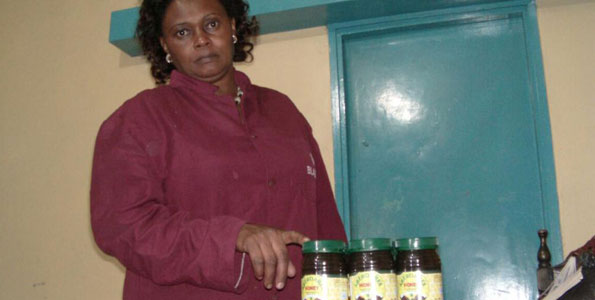Alice Njoroge lost her job as a secretary at a local research institute 12 years ago, an event which at the time seemed like a death knell for her livelihood but it has turned out to be a blessing.
She joined her husband’s insurance firm to keep herself busy and “sane”. It was while at the company that she started exporting peas, beans, bananas and yams but quit this line of business after falling victim to a conman — once again throwing her life into a spin.
In 2010 a swarm of bees made a home of her mother’s ceiling in Kahariro, Murang’a.
Ms Njoroge, a resident of Buru Buru in Nairobi, recalls boys in her rural home unsuccessfully trying to convince her aging mother to let them harvest the honey for sale.
“This was an eye-opener to me and I decided bee keeping was the way to go,” she told Enterprise.
“My husband thought I was crazy. He could not understand why I settled on bee keeping as an alternative source of income and not dairy farming, for instance.”
A friend, who was already in the bee-keeping business, referred her to the Kenya Beekeeping Association off Lenana Road, Nairobi, where she paid Sh10,000 for a week-long training.
She acquired 10 beehives at the cost of Sh50,000 and installed them at their Murang’a home. Two of the hives were placed in the ceiling, right where the bees first settled.
After seven months all the beehives were occupied. Upon harvesting, each produced at least 15 kilogrammes of honey. This almost instant success saw Ms Njoroge register Aberdares Honey, a semi-processed honey brand which she sells at retail outlets, hotels and individual households for Sh300 a kilogramme.
In 2013, she constructed another 78 beehives at a total cost of Sh300,000 using her savings. She has since then increased the hives to 113 with 10 of them in her mother’s ceiling.
She advises that beekeepers should feed their bees in order to relieve them of the stress that comes with searching for nectar over long distances and boost output.
“Letting bees search for their own food, however natural, cuts down on their productivity,” she explains, adding that she mostly feeds them in the dry and cold seasons.
“I used to feed mine with sugar syrup until recently when I stopped since this reduces the honey’s quality. I now feed them with cassava and soya beans flour and at times fruits like pineapples and mangoes.”
Alice also makes money by selling the queen bees in her hives at Sh2,500 each. During the migration period in August and September, she makes about 15,000 from selling queen bees to research firms and other beekeepers.
Worker bees, she says, normally begin feeding one of their own and nurture her into a new queen once they realize that the existing queen bee has been removed from their hive.
She also harvests bee wax and makes products like skin oil, soap and candles from the comfort of her home. She extracts a kilogramme of wax from every 10kg of honey harvested and sells it at Sh600. Ms Njoroge also extract propolis — a resinous sap which bees collect from cone-bearing trees — for its medicinal value and also bee pollen, which she says is used to boost libido.
A tablespoon of propolis retails for Sh20,000 in Western markets, she says. Ms Njoroge is now looking to get into the bee venom business, with plans to sell the product in Nigeria and Germany.
“Propolis can help heal stubborn acne and other skin conditions, boost immunity, curb cold, flu as well as being used as a wound cleaner,” Felix Opinya, an animal science expert at Egerton University, told Enterprise.
“The venom left behind in a person’s body after a sting has anti-inflammatory properties while at the same time it can cure arthritis and related conditions.”
Ms Njoroge, who refers to herself as a beekeeping expert, has received further training from the Centre for Bee Research and Development in Nigeria as well as the Kenya Honey Council. She also offers public lectures at Kenyatta University on her business.










would like to learn